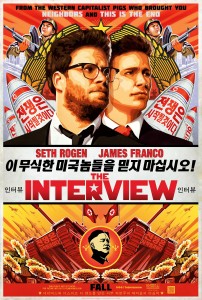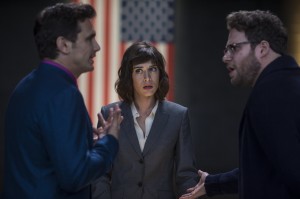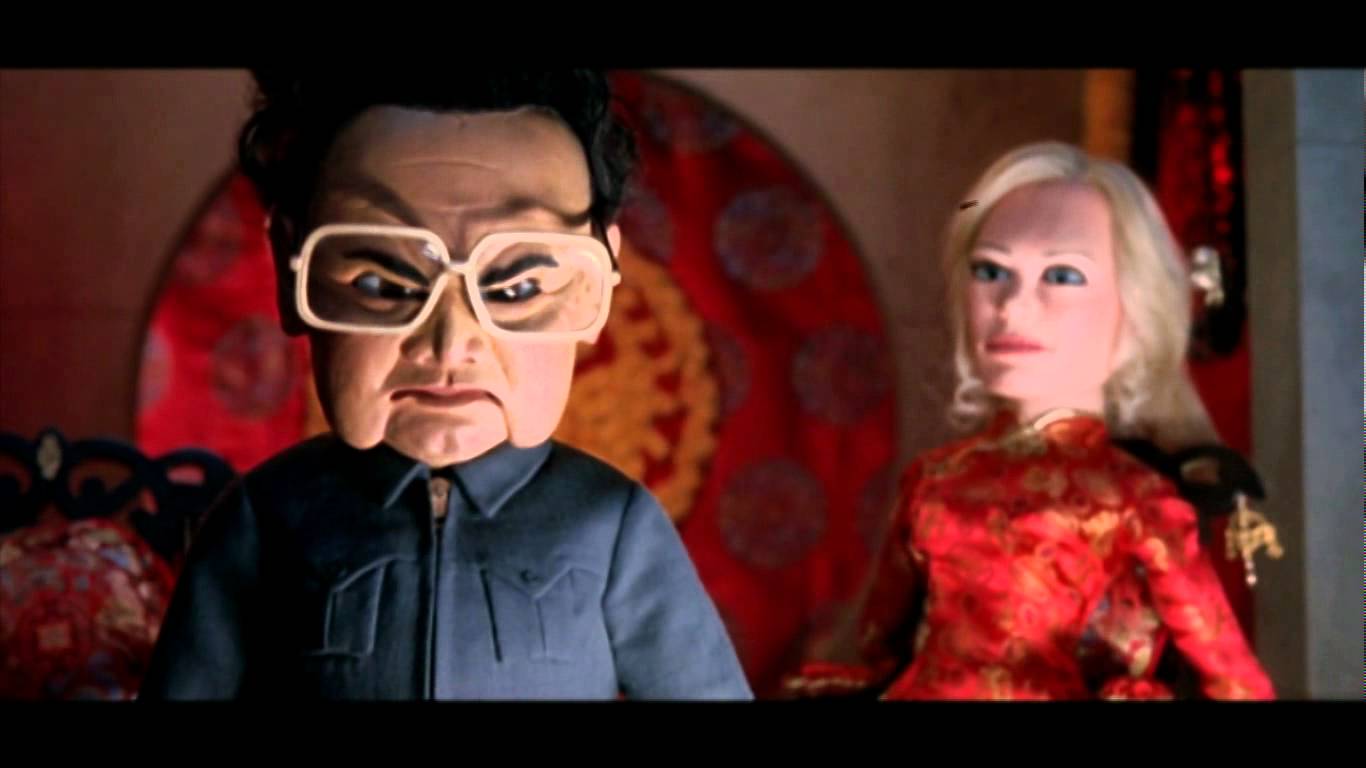 Let me tell you what I liked about The Interview: the print promotion. Loved the Marx-Engels, classic Communist kitsch-futurist filtered through an ironically pixelated CGI-inflected graphic poster design. The trailer did not look particularly promising; though I could see there were a few manic moments that might deliver some measure of hilarity. Amongst the leads, Randall Park looked as if he was making the most of his Kim Jong-Un role—possibly a breakthrough there. As for Seth Rogen and James Franco…. $8.4 million? Hmm…. Beyond that I’ve only seen a couple of clips; and—full disclosure—I doubt whether I’ll be viewing much more of it. Just not my kind of picture.
Let me tell you what I liked about The Interview: the print promotion. Loved the Marx-Engels, classic Communist kitsch-futurist filtered through an ironically pixelated CGI-inflected graphic poster design. The trailer did not look particularly promising; though I could see there were a few manic moments that might deliver some measure of hilarity. Amongst the leads, Randall Park looked as if he was making the most of his Kim Jong-Un role—possibly a breakthrough there. As for Seth Rogen and James Franco…. $8.4 million? Hmm…. Beyond that I’ve only seen a couple of clips; and—full disclosure—I doubt whether I’ll be viewing much more of it. Just not my kind of picture.
Granted Hollywood isn’t really making movies for people of my, uh, ‘demographic’ lately. Judging from the product being released, both independent and big budget studio productions, both here and abroad, I’m guessing about ten percent of the commercial feature film output is directed to theatre-goers like me. (‘Theatre-goer’ being the operative description here—another winnowing factor: those of us who prefer viewing films on a big screen in a more or less specialized theatrical venue.) But then, given my 12 year-old nephew’s blasé reaction to it, I’m wondering whether a film like The Interview will even be reaching its ‘target’ demographic much longer, revealing yet another pitfall down the road: a very brief shelf life in Sony’s film library.
Sensationalism gone nuclear in a chronically unstable media market; the unreliable, chaotically fluctuating demographics; the cult of the ‘get’ versus the cult of personality in an age of ubiquitous selfies; the fingerprints of government monitoring and manipulation over just about everything and everyone—it’s tantalizing to think what could have been done with an Interview-type scenario against this richly duplicitous backdrop in the hands of, say, Terry Southern, Robert Towne, Paddy Chayefsky, Michael O’Donoghue, or maybe Don Roos. Or, say, Trey Parker and Matt Stone: paring away the ‘characters’ to comic book cartoon silhouettes, the masters of South Park managed to have a bit of fun with both Kim Jong-Il and his American nemeses (including Hollywood) in their marionette theatre of the ridiculous Team America: World Police. (With those insane Emmanuelle Khanh specs—you wondered if they were taking a shot at Lew Wasserman as much as Kim Jong-Il.)
Which brings us to the Sony Hack—now a hemorrhage. The most absurd aspect of this melt-down was that the film Sony released had no political point to make at all. Before the extent of the hack was known, a few people speculated that it might even be a deliberate publicity stunt to resuscitate a film that might be badly singed in its first reviews. The advance word was that it was not exactly going to be the greatest comedy ever made; and the first reviews more or less panned it.
Sony’s halting first steps were no stunt. Although the possibility of an actual North Korean [DPRK]-executed terrorist assault on an exhibition venue seemed extremely remote, there are probably just enough home-grown psychopaths and fantasy-terrorists to give a few exhibitors pause. (No one wants to be the next freak Aurora-style cineplex kill zone.) The exhibitors have their own set of insurance liabilities. However belatedly, Sony was probably taking its own down-line liabilities pretty seriously; and it was already looking at losses approaching $1 billion. (The personal ID theft has already cost something approaching $150 million and will likely cost much more.)
It was inevitable that Sony would attempt at some point to mitigate their losses and find a way to distribute the film in select venues and/or as video on demand; and sure enough, they did both simultaneously on Christmas Day. This was a matter of fiduciary responsibility: including the film’s $44 million budget, the studio stood to lose roughly $100 million in projected revenues if the film was simply written off. (So far the studio has recouped a bit less than half the film’s budget.) Also—the damage was already done. Even (assuming they cared) the DPRK ‘showrunners’ were likely to see that (though how they might react if bootleg copies of the film ever landed on screens there is anyone’s guess).
This was decidedly not a victory for free speech or freedom of expression. Nor for that matter would it be if the film actually did penetrate the DPRK (though conceivably such a contraband DPRK ‘screen event’ might represent a different kind of U.S.-style ‘shock and awe.’) This was a victory for another kind of communication: commerce. To listen to the pundits, propagandists, and Hollywood boosters, you would think the Sony hack was a wholesale attack on the U.S. Constitution’s First Amendment, the Four Freedoms doctrine, the U.S. economic foundation and commercial enterprise generally, and the American Way of Life. Senator John McCain went so far as to call it an “act of war.”
It was nothing of the kind. Actually, the President’s own initially well-parsed description came closer to it. It was an act of cyber-vandalism. A half-billion dollar act of cyber-vandalism, but nevertheless. For Sony itself, the stakes were within those parameters. This was first about damage control and an unanticipated shock to their business environment; in other words, as already mentioned, their liabilities. Secondly, it was about selling a product (and/or products). This was about a moderate-sized bet with a potentially big payoff that had suddenly gone south. This was about risks and returns. This was about a high-speed train hurtling heedlessly across its territory that had suddenly been derailed. 
We’ve seen this kind of rhetorical windstorm before. The covered wagons circle and the dialectic becomes shrill and very insular: Us versus Them. ‘They’ are attacking ‘Our’ freedom of choice, speech, the Way We Live—the dialectic always couched in terms that assume our ‘way of living’ is the Standard By Which All Must Be Judged. It’s the rhetorical inverse of Amy Pascal’s apologetics: i.e., ‘this is not who we are’ (as opposed to “This is not who I am.”). As is usually the case, the reality is somewhat more ambiguous. In so many ways, this is more about our presumed freedom to do business anywhere and in any way we want. More specifically, it’s about the power of big, multi-national corporations to do business anywhere and any way they want. American individuals and small businesses mostly fend for themselves in the commercial sector. It’s hard to stay in business without some sensitivity to the fact that certain products, ‘messages’ (or business tactics), etc. play better in some markets or environments than in others. Nor do individuals or smaller organizations very often become causes célèbres—unless perhaps they’re being prosecuted for taking their constitutional liberties a bit too literally.
So just how free are we? It’s relative. At home, we think and say what we want. (Or maybe not: check with Donald Sterling on that one.) Executive e-mails to one side, we’re probably not so free expressing ourselves in most workplaces. We have a bit more latitude in certain public spaces—clubs, bars and restaurants. We’re free to express our opinions in theatres and public forums—but not yell ‘fire,’ or incite riots. (Let’s face it—in some places it’s easier to carry a gun than make an unpleasant remark, much less a controversial one.)
But there are barriers, restrictions, conventions in our so-called ‘free speech’—even editorial and creative expression—scarcely acknowledged or even noticed, that inhibit and constrain our expression. Information may ‘want to be free’ on the internet and across social media; but expression of every kind is subject to an almost infinite variety of valuations, mostly related to (what else?) commerce; a great deal of it quite random; but also reflecting the competing messages and agendas of myriad entities and individuals in both public and private sectors. The way language is used, shaped, styled; linguistic conventions and idiomatic expressions; the way pictures are framed, filtered, edited and Photoshopped—all of it sifted through search engines and who knows how many algorithmic filters—shape stories, narratives, assumptions, beliefs, opinions no less than news editors frame and hone stories and features at print newspapers. We may have more ‘choices’; but whether we’re actually informed or enlightened (as opposed to persuaded or merely provoked) by such choices is far less certain.
The commercial factors may be the most innocuous. We seem to have unfettered access to cute cat videos and XXX-rated pornography in equal measure—though there’s always the question of which ‘big brothers’ (or sisters?) happen to be watching us. But we still see lip service paid to certain conventions in what should be freer (as in no holds barred) forums. Tea Partiers and other political luddites and neanderthals to one side, there are probably more hedges on political militancy, radicalism, and ideological extremes than any kind of pornography. And it’s not just on Fox that we see a tendency to hedge, erode or blunt the truth in favor of some dubious ‘fairness’ or ‘balance.’ Scientific rigor is slighted while human prejudice, provincialism, or other bias (usually packaged as ‘human interest’) is placated, pandered to, and privileged.
There’s nothing accidental about this. Presumption of innocence in a court of law is one thing. Presumption of innocence or good will in a marketplace or public forum is quite another. There are some bad players out there—seriously bad players; and they are playing to win.
Only one set of bad players—neither commercial nor political—won here. And they had help: corporate negligence and misfeasance on a grand scale. Sony’s executives had been advised of their network vulnerabilities; their need to strengthen encryption; to purge confidential e-mails, Social Security and personal identification information; and so forth. Little or nothing was done.
Nor do they deserve any accolades for championing free speech or creative expression. This was not exactly a brave new world of 21st century comedy, however brazen the notion of graphically blowing up a named living head of state. (Ridicule wasn’t incendiary enough?) Rogen and Goldberg insisted that a fictionalized simulacrum wouldn’t be as funny; and they were probably half-right. What this should have made clear to the Sony execs was that the concept wasn’t necessarily all that funny to begin with; but they caved anyway. Beyond Rogen’s and Goldberg’s artistic/contractual rights, there was also the issue of how their ‘message’ might ‘translate’ in the global marketplace. South Korea and Japan to one side, it’s no small thing to be pushed out of China.
 So instead of a smart satirical take-down of the DPRK’s closed state-personality cult-penal colony (versus an ‘open’ celebrity-obsessed U.S. that incarcerates more people than any other country on earth), we had a stoner-slapstick comedy with a bit of super-violence. (Some people call this sort of film a ‘bromance’; but where’s the romance?) Of course all of this is permissible. But is it wise?
So instead of a smart satirical take-down of the DPRK’s closed state-personality cult-penal colony (versus an ‘open’ celebrity-obsessed U.S. that incarcerates more people than any other country on earth), we had a stoner-slapstick comedy with a bit of super-violence. (Some people call this sort of film a ‘bromance’; but where’s the romance?) Of course all of this is permissible. But is it wise?
And what about down the road? Setting the hack aside, a concept like this opens a few doors we may be less than comfortable leaving open. Sure, the DPRK is a closed, totalitarian regime—with Kim Jong-Un easy to single out as the ‘bad guy’ (as Rogen seemed to do in recent interviews). But what about those similarly closed authoritarian states that happen to be U.S. allies? You have to wonder what the President’s (or other government officials’) reaction might have been to a scenario that featured the assassination of such a named head of state. Or for that matter, how the FBI, CIA, or other part of Washington’s intelligence apparatus might react to a film made somewhere in Europe or Asia that featured the assassination of a sitting U.S. president or western European head of state. Somehow I don’t see our government leadership eager to champion such products of creative expression, much less supporting their mass distribution.
But even assuming it’s entirely permissible to leave this door wide open—is this wise? Is violence to fictionalized characters simply not sufficiently impactful anymore? (And consider those intimidated theatrical exhibitors. Does anyone really think they were concerned about DPRK operatives? This is a culture saturated in both fictional representations of violence and very factual guns.) 
The speculation now is that it was an insider job that cleverly covered certain tracks with DPRK-type digital-cyber fingerprints—a flip of the original rumor that it was a ploy to pick up opening week-end buzz and holiday ticket sales. But it’s astonishing—or not—how the FBI and White House have run with this, essentially using it as the pretext for preemptive cyber-strikes against the DPRK. I would guess that they’re looking for some way to remotely disable the DPRK’s nuclear strike capacity, much as was done in the Stuxnet collaboration with Israel against Iran’s centrifuges. In the meantime, the FBI ‘stands by’ its original findings. Funny—or not—somehow this doesn’t inspire much confidence. Someone could make a stone-cold-sober comedy out of it.



